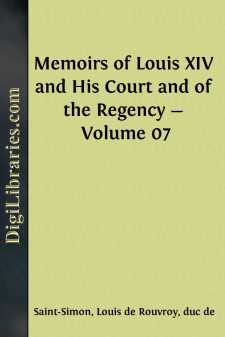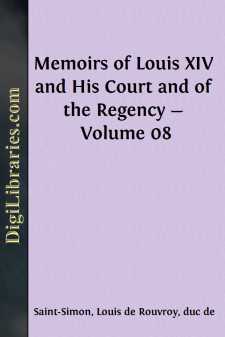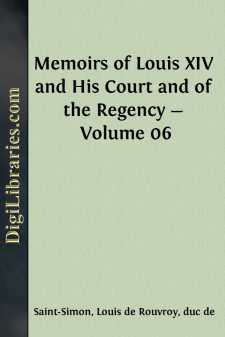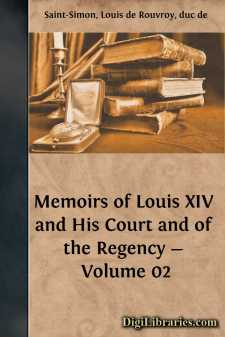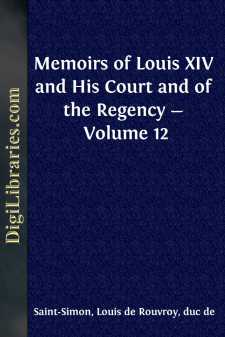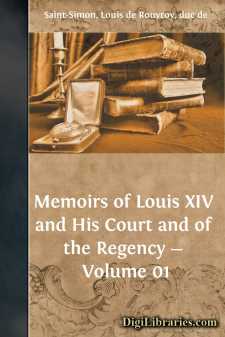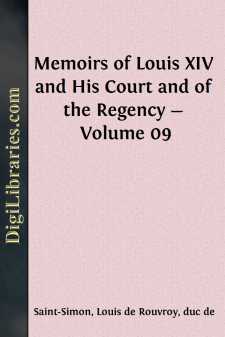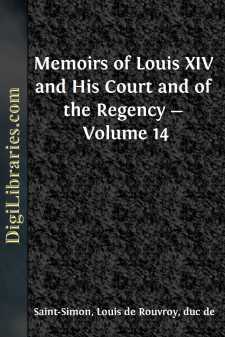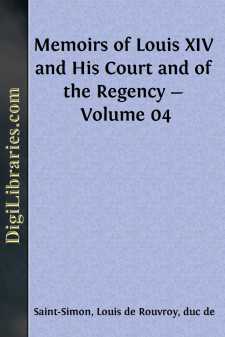Categories
- Antiques & Collectibles 13
- Architecture 36
- Art 48
- Bibles 22
- Biography & Autobiography 813
- Body, Mind & Spirit 142
- Business & Economics 28
- Children's Books 17
- Children's Fiction 14
- Computers 4
- Cooking 94
- Crafts & Hobbies 4
- Drama 346
- Education 46
- Family & Relationships 57
- Fiction 11829
- Games 19
- Gardening 17
- Health & Fitness 34
- History 1377
- House & Home 1
- Humor 147
- Juvenile Fiction 1873
- Juvenile Nonfiction 202
- Language Arts & Disciplines 88
- Law 16
- Literary Collections 686
- Literary Criticism 179
- Mathematics 13
- Medical 41
- Music 40
- Nature 179
- Non-Classifiable 1768
- Performing Arts 7
- Periodicals 1453
- Philosophy 64
- Photography 2
- Poetry 896
- Political Science 203
- Psychology 42
- Reference 154
- Religion 513
- Science 126
- Self-Help 84
- Social Science 81
- Sports & Recreation 34
- Study Aids 3
- Technology & Engineering 59
- Transportation 23
- Travel 463
- True Crime 29
Memoirs of Louis XIV and His Court and of the Regency - Volume 03
Description:
Excerpt
For the last two or three years the King of Spain had been in very weak health, and in danger of his life several times. He had no children, and no hope of having any. The question, therefore, of the succession to his vast empire began now to agitate every European Court. The King of England (William III.), who since his usurpation had much augmented his credit by the grand alliance he had formed against France, and of which he had been the soul and the chief up to the Peace of Ryswick, undertook to arrange this question in a manner that should prevent war when the King of Spain died. His plan was to give Spain, the Indies, the Low Countries, and the title of King of Spain to the Archduke, second son of the Emperor; Guipuscoa, Naples, Sicily, and Lorraine to France; and the Milanese to M. de Lorraine, as compensation for taking away from him his territory.
The King of England made this proposition first of all to our King; who, tired of war, and anxious for repose, as was natural at his age, made few difficulties, and soon accepted. M. de Lorraine was not in a position to refuse his consent to a change recommended by England, France, and Holland. Thus much being settled, the Emperor was next applied to. But he was not so easy to persuade: he wished to inherit the entire succession, and would not brook the idea of seeing the House of Austria driven from Italy, as it would have been if the King of England's proposal had been carried out. He therefore declared it was altogether unheard of and unnatural to divide a succession under such circumstances, and that he would hear nothing upon the subject until after the death of the King of Spain. The resistance he made caused the whole scheme to come to the ears of the King of Spain, instead of remaining a secret, as was intended.
The King of Spain made a great stir in consequence of what had taken place, as though the project had been formed to strip him, during his lifetime, of his realm. His ambassador in England spoke so insolently that he was ordered to leave the country by William, and retired to Flanders. The Emperor, who did not wish to quarrel with England, intervened at this point, and brought about a reconciliation between the two powers. The Spanish ambassador returned to London.
The Emperor next endeavoured to strengthen his party in Spain. The reigning Queen was his sister-in-law and was all-powerful. Such of the nobility and of the ministers who would not bend before her she caused to be dismissed; and none were favoured by her who were not partisans of the House of Austria. The Emperor had, therefore, a powerful ally at the Court of Madrid to aid him in carrying out his plans; and the King was so much in his favour, that he had made a will bequeathing his succession to the Archduke. Everything therefore seemed to promise success to the Emperor.
But just at this time, a small party arose in Spain, equally opposed to the Emperor, and to the propositions of the King of England. This party consisted at first of only five persons: namely, Villafranca, Medina- Sidonia, Villagarcias, Villena, and San Estevan, all of them nobles, and well instructed in the affairs of government. Their wish was to prevent the dismemberment of the Spanish kingdom by conferring the whole succession upon the son of the only son of the Queen of France, Maria Theresa, sister of the King of Spain. There were, however, two great obstacles in their path. Maria Theresa, upon her marriage with our King, had solemnly renounced all claim to the Spanish throne, and these renunciations had been repeated at the Peace of the Pyrenees. The other obstacle was the affection the King of Spain bore to the House of Austria,—an affection which naturally would render him opposed to any project by which a rival house would be aggrandised at its expense.
As to the first obstacle, these politicians were of opinion that the renunciations made by Maria Theresa held good only as far as they applied to the object for which they were made....



